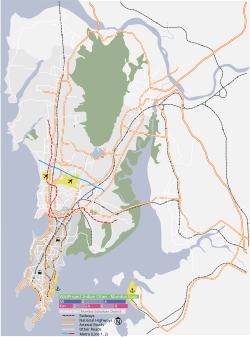Sion, Mumbai
Sion
Sheev | |
|---|---|
Neighborhood | |
 K. J. Somaiya Institute of Engineering & Information Technology near Everard Nagar, Sion | |
| Coordinates: 19°02′N 72°52′E / 19.04°N 72.86°E | |
| Country | India |
| State | Maharashtra |
| District | Mumbai City |
| City | Mumbai |
| Government | |
| • Type | Municipal Corporation |
| • Body | Brihanmumbai Municipal Corporation (BMC) |
| Languages | |
| • Official | Marathi |
| Time zone | UTC+5:30 (IST) |
| Area code | 022 |
| ISO 3166 code | IN-MH |
Sion (/ˈsaːjən/; IAST: Śīv [ʃiːʋ]) is a neighbourhood of Mumbai, Maharashtra, India. In the 17th century the village formed the boundary between Mumbai and Salsette Island. One of the local historical places in Sion is a hilltop garden commonly known as Sion Fort or Sheevon Killa in the Marathi language.
History
[edit]The name "Sion" is derived from the Marathi word "Sheev," which means boundary, as it marked the northern limits of Mumbai during the British colonial era. The area has evolved from a historic outpost into a densely populated urban locality, hosting diverse communities and cultural landmarks.[1]In 1543, the Portuguese took possession of the largely uninhabited islands of Bombay, naming it Sião, after a biblical hill in Israel.[2] The Portuguese gave the Jesuit priests the sole ownership of some of these islands. The Jesuits then built a chapel on the hill near the present-day railway station and named it after Mount Zion (Sion) in Jerusalem.[citation needed]
Notable Landmarks
[edit]Sion Fort
[edit]A relic from the British era, Sion Fort was built in the 17th century by the British East India Company. The fort, though in ruins, offers panoramic views of Mumbai and serves as a historical reminder of the city's colonial past.
A prominent church in Sion, this structure has been serving the local Christian community since the early 20th century.
Transportation
[edit]Sion is well-connected through various modes of transportation, making commuting easy for residents and visitors.
Suburban Railways
[edit]- Sion Railway Station is a major stop on the Central Line of the Mumbai Suburban Railway.
Monorail
[edit]- The Mumbai Monorail (Line 1) passes close to Sion, with GTB Nagar Station being the nearest stop, providing connectivity towards Chembur and Wadala.[3]
Roadways and Highways
[edit]- Eastern Express Highway (EEH) runs through Sion, offering direct access to Thane, Mulund, and South Mumbai.
Redevelopment and Future Prospects
[edit]Sion is witnessing increasing redevelopment efforts, with old housing societies being transformed into high-rise residential complexes. Infrastructure projects, including metro expansions and road widening initiatives, are expected to further enhance the locality’s livability.[4]
Education
[edit]Sion is also a home to many educational institutes, including:
- Ayurved College Sion
- K. J. Somaiya Institute Of Engineering & Information Technology
- SIES College of Commerce and Economics
- SIES College of Arts, Science, and Commerce
- Padmabhushan Vasantdada Patil Pratishthan's College of Engineering
- K. J. Somaiya Medical College & Research Centre.[5]
- Lokmanya Tilak Municipal Medical College and General Hospital
- Our Lady Of Good Counsel High School
Notable former residents
[edit]See also
[edit]- K. J. Somaiya Institute Of Engineering & Information Technology
- Sion Fort
- Our Lady of Good Counsel High School, Mumbai
References
[edit]- ^ Sen Gupta, P. R. (1987). "Human evolution and cultural succession in india from middle pleistocene to recent times". Mankind Quarterly. 28 (2): 99–115. doi:10.46469/mq.1987.28.2.1. ISSN 0025-2344.
- ^ D'Cunha, Jose Gerson (1900). "IV The Portuguese Period". The Origins of Bombay (3 ed.). Bombay: Asian Educational Services. p. 265. ISBN 81-206-0815-1. Retrieved 4 January 2009.
{{cite book}}: ISBN / Date incompatibility (help) - ^ Ramachandran, M. (3 November 2011), "Mumbai Metro", Metro Rail Projects In India, Oxford University Press, pp. 112–129, retrieved 13 March 2025
- ^ "Enabling Slum Redevelopment in Mumbai", Squatters as Developers?, Routledge, pp. 145–158, 2 March 2017, ISBN 978-1-315-24256-9, retrieved 13 March 2025
- ^ "KJ Somaiya Medical College and Research Centre". Retrieved 31 January 2013.

